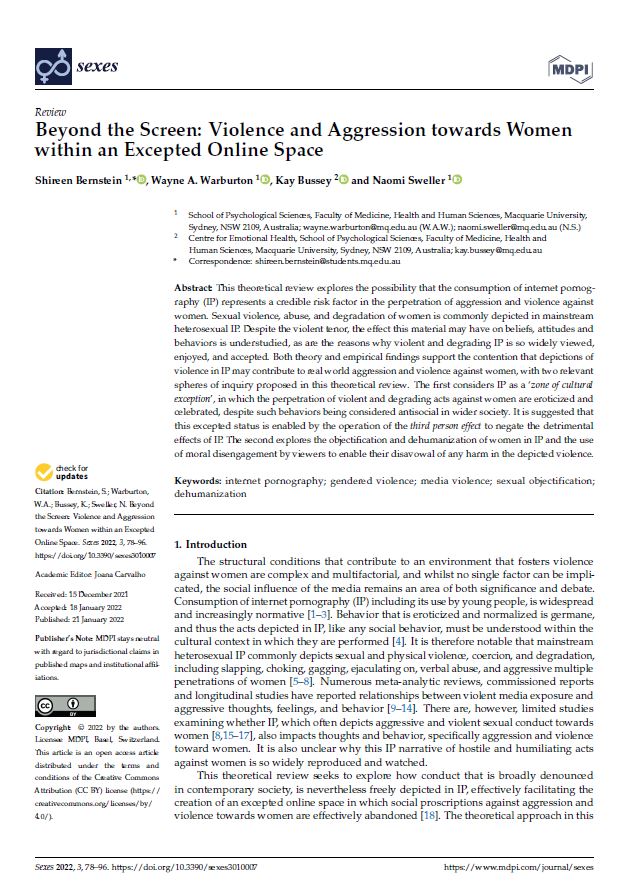Violence
Beyond the Screen: Violence and Aggression
 Full Article Title: Beyond the Screen: Violence and Aggression towards Women within an Excepted Online Space
Full Article Title: Beyond the Screen: Violence and Aggression towards Women within an Excepted Online Space
Open Access: Yes
Abstract
This theoretical review explores the possibility that the consumption of internet pornography (IP) represents a credible risk factor in the perpetration of aggression and violence against women. Sexual violence, abuse, and degradation of women is commonly depicted in mainstream heterosexual IP. Despite the violent tenor, the effect this material may have on beliefs, attitudes and behaviors is understudied, as are the reasons why violent and degrading IP is so widely viewed, enjoyed, and accepted. Both theory and empirical findings support the contention that depictions of violence in IP may contribute to real world aggression and violence against women, with two relevant spheres of inquiry proposed in this theoretical review. The first considers IP as a ‘zone of cultural exception’, in which the perpetration of violent and degrading acts against women are eroticized and celebrated, despite such behaviors being considered antisocial in wider society. It is suggested that this excepted status is enabled by the operation of the third person effect to negate the detrimental effects of IP. The second explores the objectification and dehumanization of women in IP and the use of moral disengagement by viewers to enable their disavowal of any harm in the depicted violence.
Relevance
Online technology has both amplified and normalized the capacity to engage in or view a range of violent acts whereby the pain, suffering, and humiliation of others is offered up for instantaneous gratification. The processes by which mass media depictions of violence impact the viewer are well-documented, but the impacts of IP in which women are hurt, degraded and/or abused is understudied. This theoretical review has explored these impacts, the underlying psychological processes, and the wider social impacts via two proposed hypotheses. Firstly, it has shown that these impacts are facilitated to some extent, by the positioning of IP as a zone of cultural exception where sexual acts can be viewed, shared, and appraised, with the understanding that any act, regardless of how degrading or violent it is, is not just permitted, but rewarded. Given the ubiquity of IP, it is not unreasonable to suggest that online depictions of violence, coercion and degradation also have the potential to seep into real-life attitudes, beliefs, and behaviors. Secondly, this review has shown how the objectification and dehumanization of women in IP can lead to real world violence both through the acquisition of violent and coercive sexual scripts and by creating cultural expectations that women are fungible objects that may be abused and violated with impunity…Dehumanization and objectification in IP are also mutually reinforcing, in that, together, they permit the displacement of responsibility for the harms being perpetrated, whilst allowing viewers to eschew any of the cognitive discomfort or guilt they might experience whilst viewing this behavior.”
Citation
Bernstein, S., Warburton, W. A., Bussey, K., & Sweller, N. (2022). Beyond the Screen: Violence and Aggression towards Women within an Excepted Online Space. Sexes, 3, 78–96. https://doi.org/10.3390/sexes3010007
